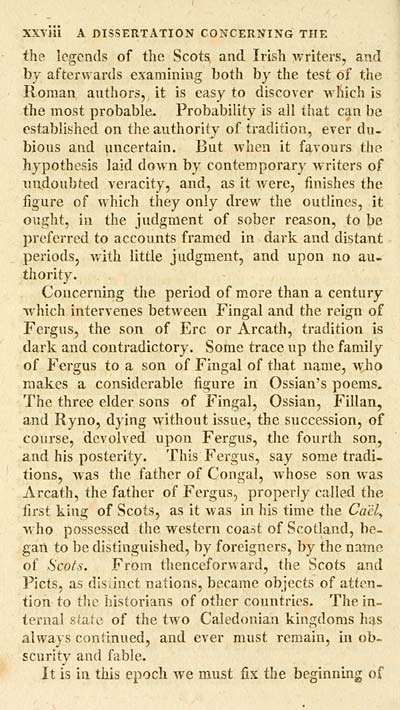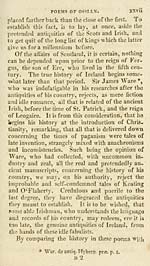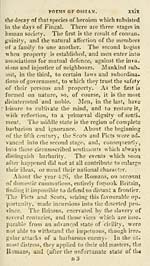Ossian Collection > Poems of Ossian > Volume 1
(46)
Download files
Complete book:
Individual page:
Thumbnail gallery: Grid view | List view

XXViU A DISSERTATION CONCERNING THE
the legends of the Scots and Irish writers, and
by afterwards examining both by the test of the
Roman authors, it is easy to discover which is
the most probable. Probability is all that can be
established on the authority of tradition, ever du-
bious and uncertain. But when it favours the
hypothesis laid down by contemporary writers of
undoubted veracity, and, as it were, finishes the
figure of which they only drew the outlines, it
ought, in the judgment of sober reason, to be
preferred to accounts framed in dark and distant
periods, with little judgment, and upon no au-
thority.
Concerning the period of more than a century
which intervenes between Fingal and the reign of
Fergus, the son of Ere or Arcath, tradition is
dark and contradictory. Some trace up the family
of Fergus to a son of Fingal of that name, who
makes a considerable figure in Ossian's poems.
The three elder sons of Fingal, Ossian, Fillan,
and Ryno, dying without issue, the succession, of
course, devolved upon Fergus, the fourth son,
and his posterity. This Fergus, say some tradi-
tions, was the father of Congal, whose son was
Arcath, the father of Fergus, properly called the
first king of Scots, as it was in his time the Caely
who possessed the western coast of Scotland, be-
gan to be distinguished, by foreigners, by the name
of Scots. From thenceforward, the Scots and
Picts, as distinct nations, became objects of atten-
tion to the historians of other countries. The in-
ternal state of the two Caledonian kingdoms h:is
always continued, and ever must remain, in ob-
scurity and fable.
It is in this epoch we must fix the beginning of
the legends of the Scots and Irish writers, and
by afterwards examining both by the test of the
Roman authors, it is easy to discover which is
the most probable. Probability is all that can be
established on the authority of tradition, ever du-
bious and uncertain. But when it favours the
hypothesis laid down by contemporary writers of
undoubted veracity, and, as it were, finishes the
figure of which they only drew the outlines, it
ought, in the judgment of sober reason, to be
preferred to accounts framed in dark and distant
periods, with little judgment, and upon no au-
thority.
Concerning the period of more than a century
which intervenes between Fingal and the reign of
Fergus, the son of Ere or Arcath, tradition is
dark and contradictory. Some trace up the family
of Fergus to a son of Fingal of that name, who
makes a considerable figure in Ossian's poems.
The three elder sons of Fingal, Ossian, Fillan,
and Ryno, dying without issue, the succession, of
course, devolved upon Fergus, the fourth son,
and his posterity. This Fergus, say some tradi-
tions, was the father of Congal, whose son was
Arcath, the father of Fergus, properly called the
first king of Scots, as it was in his time the Caely
who possessed the western coast of Scotland, be-
gan to be distinguished, by foreigners, by the name
of Scots. From thenceforward, the Scots and
Picts, as distinct nations, became objects of atten-
tion to the historians of other countries. The in-
ternal state of the two Caledonian kingdoms h:is
always continued, and ever must remain, in ob-
scurity and fable.
It is in this epoch we must fix the beginning of
Set display mode to: Large image | Transcription
Images and transcriptions on this page, including medium image downloads, may be used under the Creative Commons Attribution 4.0 International Licence unless otherwise stated. ![]()
| Early Gaelic Book Collections > Ossian Collection > Poems of Ossian > Volume 1 > (46) |
|---|
| Permanent URL | https://digital.nls.uk/77946822 |
|---|
| Shelfmark | Oss.79 |
|---|---|
| Additional NLS resources: | |
| Attribution and copyright: |
|
| Description | " ... to which are prefixed, 'Dissertations on the aera and poems of Ossian translated by James Macpherson'". |
|---|---|
| Shelfmark | Oss.79-80 |
| Additional NLS resources: | |
| Description | Selected books from the Ossian Collection of 327 volumes, originally assembled by J. Norman Methven of Perth. Different editions and translations of James MacPherson's epic poem 'Ossian', some with a map of the 'Kingdom of Connor'. Also secondary material relating to Ossianic poetry and the Ossian controversy. |
|---|
| Description | Selected items from five 'Special and Named Printed Collections'. Includes books in Gaelic and other Celtic languages, works about the Gaels, their languages, literature, culture and history. |
|---|

